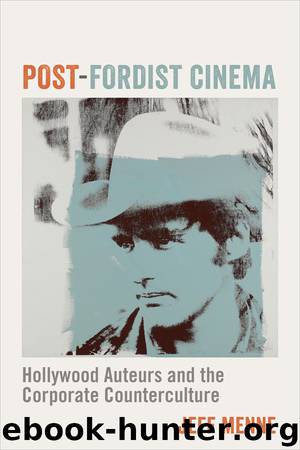Post-Fordist Cinema by Jeff Menne;

Author:Jeff Menne;
Language: eng
Format: epub
Publisher: Columbia University Press
FIGURES 3.1 AND 3.2 George Roy Hill begins Butch Cassidy and the Sundance Kid by casting it in relation to the long tradition of Hollywood westerns.
Modernism, for all that its concept has been aesthetic autonomy, was for Zanuck-Brown a claim of professional autonomy that was ready for deployment against industrial reorganization.30 The period of reorganization at Fox is best marked by the 1962 split between DZ and Spyros Skouras, a split which signaled a diremption of the West Coast–East Coast relationship. The board at Fox wanted Skouras out, in part due to the public relations fiasco of Cleopatra, and DZ was not concerned with helping him. DZ was at the end of his “Paris years,” time he had spent (somewhat dissolutely) in France as an independent producer after resigning from Fox in 1956. On his departure, Buddy Adler became head of production but, lacking DZ’s charismatic authority, could not be a counterweight to Skouras, who, Peter Lev says, “micromanaged” him.31 When the board later ousted Skouras, however, DZ realized that they intended to arrogate power for themselves. The activist shareholder, Judge Samuel Rosenman, filled the void left by Skouras. DZ objected. “I do not believe that stockbrokers or their attorneys are qualified to endorse or annul film proposals,” he wrote in a memo, “any more than I am qualified to plead a case in court or sell stock.”32 It is fair to say that he was objecting not simply to the situation at Fox but to the situation of the film industry tout court. “As I see it today,” DZ had written to his friend and screenwriter Phillip Dunne, “the boss of the Studio is actually no longer a boss—he has a title but that is all. He is the slave of agents and actors with their own corporations and insane competition from independent operators and promoters who are willing to give away 100% of the profits just as long as they get a distribution fee.”33 DZ therefore returned to Fox in 1962 to assume the presidency vacated by Skouras, not because he brought with him a new vision of Hollywood authority but because he wished to keep at bay the boardroom authority that was otherwise encroaching.
David Brown remarks that when studio employees received news of DZ’s return, “there literally was dancing in the corridors of the administration building.”34 His return suggested a restored belief in Old Hollywood magic. “The pure producers such as Zanuck, David O. Selznick, Samuel Goldwyn, and Sam Spiegel,” wrote Brown, “were the closest to today’s auteur directors.” Brown came to work for DZ in 1951, indeed, because he admired him. DZ was “the creative boss. As for the pictures he personally produced, his artistic commitment was total.” Of DZ and Irving Thalberg, David Brown said, “Those men enjoyed creative autonomy.” Though they answered ultimately to their bosses in New York, “they suffered no interference in their day-to-day operations.”35 But autonomy on that model would not be recovered. DZ put his son, Richard, in charge of
Download
This site does not store any files on its server. We only index and link to content provided by other sites. Please contact the content providers to delete copyright contents if any and email us, we'll remove relevant links or contents immediately.
The Kite Runner by Khaled Hosseini(4963)
Gerald's Game by Stephen King(4386)
Dialogue by Robert McKee(4178)
The Perils of Being Moderately Famous by Soha Ali Khan(4071)
Story: Substance, Structure, Style and the Principles of Screenwriting by Robert McKee(3334)
The 101 Dalmatians by Dodie Smith(3317)
The Pixar Touch by David A. Price(3226)
Confessions of a Video Vixen by Karrine Steffans(3111)
How Music Works by David Byrne(2970)
Fantastic Beasts: The Crimes of Grindelwald by J. K. Rowling(2856)
Harry Potter 4 - Harry Potter and The Goblet of Fire by J.K.Rowling(2819)
Slugfest by Reed Tucker(2811)
The Mental Game of Writing: How to Overcome Obstacles, Stay Creative and Productive, and Free Your Mind for Success by James Scott Bell(2773)
4 - Harry Potter and the Goblet of Fire by J.K. Rowling(2543)
Screenplay: The Foundations of Screenwriting by Syd Field(2444)
Scandals of Classic Hollywood: Sex, Deviance, and Drama from the Golden Age of American Cinema by Anne Helen Petersen(2405)
Wildflower by Drew Barrymore(2385)
The Complete H. P. Lovecraft Reader by H.P. Lovecraft(2375)
Casting Might-Have-Beens: A Film by Film Directory of Actors Considered for Roles Given to Others by Mell Eila(2311)
